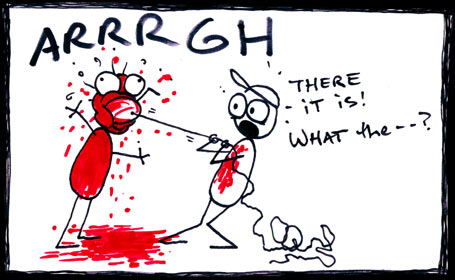I thought I was too old to have obsessions.
My triumphant return to college/Boston will occur tomorrow, Monday. I stopped working and promptly started packing last Saturday. Since then I have been in some strange, transitory phase both physically and psychologically. I am prepared to leave, but I must stay for a week. I'm glad this week, which I've so sorely wallowed through, has finally come to an end (I had my wisdom teeth pulled to keep me busy, it seems). I've been arduously fighting off ennui, like always, with film, literature and music; I'd lead a completely insignificant life without them. Over the past week, I have fallen in love with a novel and a music video (that covers both film and music, correct?).
The novel is Virginia Woolf's delicate, yet tough, To the Lighthouse (more on that in my 'summer reading recap,' which should appear here in the near future). I discovered the music video --a medium I usually feel indifferent towards because the music occasionally clashes with the imagery in a negative way-- while browsing youtube in my boredom. The video is for Belle and Sebastian's catchy/meloncholy (of course, it's Belle and Sebastian) "Jonathon David."
 How this video escaped me before, I have no idea -- but I'm very glad I did encounter it. It's my favorite contemporary band making a music video which closely resembles a French New Wave film (complete with jump cuts!).Enjoy -- as I have many, many times. Does any particular film come to mind? I know one does. Take a wild guess.
How this video escaped me before, I have no idea -- but I'm very glad I did encounter it. It's my favorite contemporary band making a music video which closely resembles a French New Wave film (complete with jump cuts!).Enjoy -- as I have many, many times. Does any particular film come to mind? I know one does. Take a wild guess.
Yeah, she's a little chubby.
Catherine Breillat's Fat Girl is an incisive and indelible look at sexuality -- sexuality as a game of course. Larry Clark, take notes. The most telling scene is the 20 minute long, 'almost-every-teenager-has-probably-gone-through-this' seduction scene. Within these twenty minutes (which, when I looked at the DVD clock, was shocked to see was longer than 7 or 8 minutes), the dominance swaps from male to female, and back to the male again. Its playful, and ultimately devastating, to see the genders swap power -- and the scene is brillaintly acted. To make it even richer, the conversation and sexual acts are being voyeuristically watched by another character (through a couple of her fingers), whom they know is in the room (although a potent question to ask would be: did they ever forget she was there?).  The titular porker. You don't want to know what kind of photos I was exposed to during the google image search for this picture.I really appreciate how, beyond the central 'relationsip' in the film, Breillat deftly manages to balance the corrupting of the sisters. One is being sexually exploited (by a skilled, yet still transparent, lothario) and her slightly-corpulent sister is becoming more and more sexually repressed (taking out her sexual frustration on various poles in the pool -- great little scene). I didn't think its insights into sisterhood were as successful as its statement on teenagers and sex, though. It's not exactly a subtle film, but it's just overtly malicious and candid enough (I, oddly, don't have a problem with the ending, which makes quite a bit of sense when considering the rest of the film, which is wrapped in such mourning) to get its point across effectively and uniquely. I think it's one of the better films to be released in 2001. It's right behind Monsters Inc. By the way, seeing the film gives a new meaning to the DVD cover. It's probably one of my favorite Criterion covers -- I love when more information gives you a whole new perspective on an image.
The titular porker. You don't want to know what kind of photos I was exposed to during the google image search for this picture.I really appreciate how, beyond the central 'relationsip' in the film, Breillat deftly manages to balance the corrupting of the sisters. One is being sexually exploited (by a skilled, yet still transparent, lothario) and her slightly-corpulent sister is becoming more and more sexually repressed (taking out her sexual frustration on various poles in the pool -- great little scene). I didn't think its insights into sisterhood were as successful as its statement on teenagers and sex, though. It's not exactly a subtle film, but it's just overtly malicious and candid enough (I, oddly, don't have a problem with the ending, which makes quite a bit of sense when considering the rest of the film, which is wrapped in such mourning) to get its point across effectively and uniquely. I think it's one of the better films to be released in 2001. It's right behind Monsters Inc. By the way, seeing the film gives a new meaning to the DVD cover. It's probably one of my favorite Criterion covers -- I love when more information gives you a whole new perspective on an image.
More proof that God hates me (and the human race).
Why were wisdom teeth (and, after I think about it, an appendix) ever placed in the human body (namely, mine)?Today, I will have my wisom teeth removed. I know it's a rather simple operation, but I am not comforted by the idea of an operation being done in the back of my mouth. My grandmother called me yesterday to wish me 'luck' during the operation. This, of course, struck some sort of mental --not dental-- nerve; why would she call to wish me luck if it wasn't a big deal? So, thanks to my well-intending granmother, I have a vision in my head which is somewhat similar to this cartoon I encountered:  I believe three of my wisom teeth are 'impacted' (I've avoided finding out what that means for my own mental health, because I don't think its good). I will, fortunately, be put to (temporary) sleep when they start sawing away (a friend, who had them moved in Spain, just had a shot or two of novocaine -- the horror!). Needless to say, I will probably be watching A Chipmunk Adventure for the whole week -- and I'll try to steer clear of Little Shop of Horrors and Timmy the Tooth. Therefore, please share (audience participation!) your stories of painful jaws, applesauce and painkillers. I need them.
I believe three of my wisom teeth are 'impacted' (I've avoided finding out what that means for my own mental health, because I don't think its good). I will, fortunately, be put to (temporary) sleep when they start sawing away (a friend, who had them moved in Spain, just had a shot or two of novocaine -- the horror!). Needless to say, I will probably be watching A Chipmunk Adventure for the whole week -- and I'll try to steer clear of Little Shop of Horrors and Timmy the Tooth. Therefore, please share (audience participation!) your stories of painful jaws, applesauce and painkillers. I need them.
The most unpleasant surprise of the summer? I think so.
I was initially wary that Little Miss Sunshine would be an annoyingly platitiudinous, dysfunctional-family-goes-on-a-road-trip-to-self-discovery flick. And, you know what, it sort of is. The most shocking thing about the film, though, is that it doesn't helplessly try to grab the scarf-clad, Zach Braff acolytes; this film teaches me that all Sundance-approved productions can have flaws that come in all different shapes and sizes.

The well-intending cast of Little Miss Sunshine realize that they're stranded with a hopeless screenplay
Despite an advertising campaign very reminiscent to Garden State, the film is much more thematically similar to Alexander Payne's Sideways. Little Miss Sunshine is, essentially, a film about winners and losers -- and how losers can be winners. Isn't that sweet? Oh, and it's also a critique on suburbia, America (placed outside of the suburbs and on various highways) and superficiality. The film is funamentally very confused; the problem is that it's either not nasty enough or not genuine and sweet enough. Situations full of truth are stretched thin and made implausible by caricatures played by actors who try desperately to ground their characters -- characters which each take about 45 seconds to set-up (although we're given at least 10 minutes for each). Each individual in the Hoover family is given a title (Steve Carrell is the 'gay, suicidal Proust-scholar,' while Paul Dano is the 'aloof, reserved Nieztche-reading teenager' and Alan Arkin is the 'certifiable, potty-mouthed, horny, drug-addicted grandpa' who is a veteran of some war); the characters are so exaggerated that its difficult to believe the screenwriter was unaware of their phoniness. Worse than them being caricatures, some of them don't even earn their predicated 'title.' I would never believe that Carrell's character is a homosexual, ex-professor if I wasn't repeatedly told so. Then, towards the final act, the film builds a bit of its 'own' (confused, trite) philosphy ('suffering is the essence of life, so why try avoiding it?'), yet it contradicts itself in the very next scene (when the protagonist who just learned that pearl of wisdom tries to dissuade his younger sister from performing in a pageant, where he believes she'll suffer). Due to the film's various inconsistencies (in characters, warped philosophy and tone) Little Miss Sunshine is not just an irritating, clichéd, self-proclaimed 'indie flick,' but a rather unfunny, inept and muddled film.
The most pleasant surprise of the summer? I think so.
After plans to see Little Miss Sunshine (a film I'm a bit wary of because I believe it may fall victim to indie-hipster niche-marketing, but I shall see if my instincts are off tomorrow) with a friend collapsed, my visiting cousins and I opted to take in a late show at the multiplex. DJ: "I really, really hope hallucination is just a side-effect of puberty."
DJ: "I really, really hope hallucination is just a side-effect of puberty."
Monster House is probably the best film I've seen this summer, and it includes a statement on childhood and play more potent and less cloying than Finding Neverland's. Its ludicrous plot --an anthropomorphised house gobbles up basketballs, kites and tricycles (all symbols of youth and adolescent recreation) while snapping its tongue-like carpet at the protagonists if they step on the very green lawn-- doesn't exactly sound appealing to the reality-inclined viewer. The filmmakers, however, refreshingly cram much truth into such an absurd premise to produce a highly enjoyable, yet sinister and abstract production. As the thirteen year-old protagonists wave bye-bye to adolescence, their imaginations begin to run as wild as their burgeoning hormones (enter: Jenny, a sassy, young-teen neighbor).
Within five minutes of the film, DJ --the main "soon-to-be-a-man" kid-- accidently cracks his voice when addressing his parents; Monster House should be appreciated most as a film with rich subtext and a pitch-perfect representation of the confounding and physically/psychologically evolving period of a young adults life. It's not a film without some flaws -- and the second, more action-packed and narrative-driven, half is not nearly as intriguing or sharp as the angsty, deep first act, which captures the essence of puberty (giggle, giggle). Its depiction is spookily accurate.
It's a shockingly uncompromising, ominous and sophisticated film --despite the incongruous vulgar humor, which pops up on occasion-- about maturation, mortality and temptation. The films ideas and themes may be presented in a bit of a clunky manner at times (even though they are legitimate, honest and sincere) but the animation is always meticulous and the casting is particularly inspired.
In other news, Clerks II and World Trade Center contribute to the mediocre cinematic summer of 2006 (even if the Clerks sequel is much, much too vile to be considered 'mediocre').








